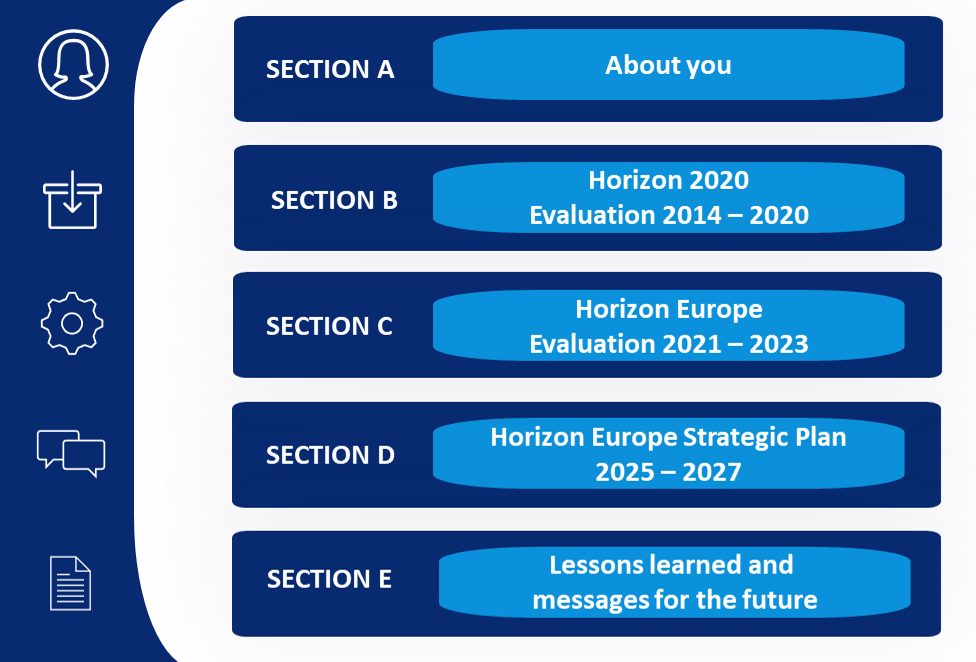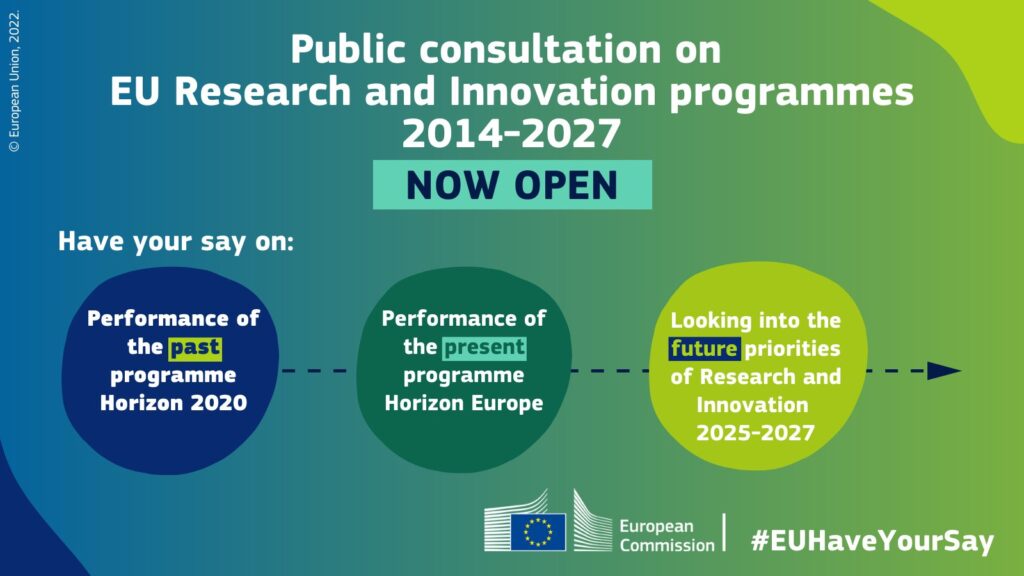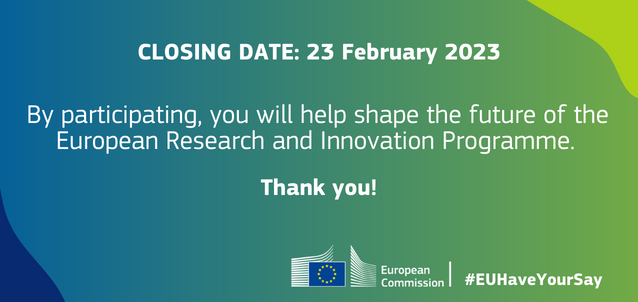Public consultation on the past, present and future of the European R&I Framework programmes 2014-2027. Fill in the survey and share your views on the performance of Horizon 2020 and Horizon EU, and shape the EU R&I priorities for 2025-2027. You have time until 23 February!

Public consultations of framework programmes
Commission launched in December 2022 the largest public consultation ever held on the past, present and future of the EU’s Horizon research and innovation programmes 2014-2027. In line with the Commission’s effort towards better Regulation, stakeholders will be able to share their views on the performance of Horizon 2020 and Horizon Europe, as well as shaping the strategic orientations for the Horizon Europe Strategic Plan 2025-2027. The consultation is open for 12 weeks and questions are accessible in English, German and French. Participants can reply in all EU languages. For any questions related to the consultation, please contact RTD-PUBLIC-CONSULTATION-HORIZON@ec.europa.eu.
You can learn more about it in details HERE, where you will find additional information about evaluation timeline and specifically Horizon Europe’s Key Impact Pathways and the programme impact assessment.
The public consultation allows participants to:
- Point out the achievements and shortcomings of the previous EU research and innovation programme Horizon 2020, its relevance and the procedures associated with the application process and funding management;
- Express views on Horizon Europe’s design and implementation up until now, with similar approach as outlined above;
- Identify future priorities for Horizon Europe’s Strategic Plan 2025-2027, providing inputs on emerging research and innovation needs, on synergies across EU programmes, etc.
Components of the public consultation process
This consultation aims to collect the views of research institutions, businesses, consumer organisations, as well as non-governmental organisations, public authorities, and other stakeholders on the European Union Framework Programmes (FP) for Research & Innovation, Horizon 2020 (8th FP) and Horizon Europe (9th FP).
The consultation has five sections:

- Section A “About you” asks information about the respondent’s profile.
- Section B focuses on the past programme Horizon 2020 (2014 – 2020) and aims to collect feedback and evidence to draw lessons from the past. This part of the consultation will feed into the ex-post evaluation of Horizon 2020.
- Section C focuses on the current programme Horizon Europe (2021 – 2027) and aims to take stock of what stakeholders are currently experiencing to possibly adapt current actions. This part of the consultation will feed into the mid-term evaluation of Horizon Europe, covering the period 2021 – 2023.
- Section D collects views and opinions for the upcoming Strategic Plan of Horizon Europe (2025 – 2027). The questionnaire concerns the future societal challenges that should shape future EU research and innovation activities, the strengths and weaknesses of the European R&I system, EU Missions, European Partnerships and synergies with other EU programmes.
- Section E asks about the key lessons learned and messages for the future. If you wish so, you can upload a position paper in this section.
REMEMBER: You can choose to complete only one or more sections of the consultation.
As the consultation looks at the past, the present and the future of European Research Framework Programmes, some topics are addressed under multiple sections. For example, both section B (Horizon 2020) and section C (Horizon Europe) examine how the programmes contributed (or is contributing) to climate, health, digital and industrial transitions. Likewise, questions on the programme’s implementation and administrative procedures are asked in the two sections to account for the simplification measures introduced in Horizon Europe.
You can save your contribution as a draft on the server and continue later or on a different day. Your answers will be treated confidentially and will be statistically processed. The results will be anonymised and presented at an aggregate level only in a results report.

Below you will find a breakdown of sections B to D with relevant background information and list of key evaluation questions.
Horizon 2020’s final evaluation (section B)
Horizon 2020 was the EU’s research and innovation funding programme for 2014-2020, with a budget of nearly €80 billion. Horizon 2020’s overall objectives were: (i) to help the EU become a knowledge and innovation-based economy and society, (ii) to promote smart, sustainable and inclusive growth in line with Europe 2020 strategy and other EU policies and (iii) to complete and support the European single market for research, innovation and technology (the European Research Area).
More specifically, Horizon 2020 aimed to:
- strengthen the EU’s science base,
- support the technological leadership and innovation capability in the private sector,
- ensure that societal challenges received more attention in research and innovation,
- boost the amount of cross-border coordination.
Purpose and scope of the final H2020 evaluation
The evaluation will analyse the design and implementation, results and impacts of the programme from 2014 to 2020. It will cover all Horizon 2020 instruments, in every scientific fields supported. This evaluation will help with implementation of current EU research and innovation measures and with the design of future measures. The evaluation will address the relevance, coherence, EU value added, the efficiency and the effectiveness of the programme.
Commission will look into the rationale for the programme, its implementation and achievements, and its longer-term impacts and sustainability. It will also review the dissemination and exploitation of research results, open access policy and cross-cutting issues, among other aspects of the programme. In particular, the efficiency analysis will review costs and benefits for applicants to the programme, and will include an assessment of potential unnecessary burdens and complexities for applicants and participants.
Examples of questions from the evaluation questionnaire:
- What are the main benefits of participating in Horizon 2020 compared to national and/or regional R&I programmes?
- What are the main reasons that may have prevented potential beneficiaries from participating in Horizon 2020?
- Your opinion concerning implementation and administrative procedures in the calls for proposals under Horizon 2020
- Your opinion concerningproposal evaluation under Horizon 2020
- Your opinion concerning the project implementation under Horizon 2020
- Your opinion concerning simplification measures, introduced in Horizon 2020, in order to help reduce your administrative burden
- Your opinion concerning time spent on the proposal preparation for Horizon 2020, compared with FP7 and/or other programmes
- Your opinion concerning time and efforts spent of project management in Horizon 2020
- Your opinion concerning a number of novelties were introduced to increase the programme’s impact
- Your opinion concerning the programme’s impact for science, the economy and/or society
- Your opinion, to what extent have public-private and public-public Partnerships supported by Horizon 2020 been more effective, compared to regular collaborative research
- Your opinion concerning synergies under Horizon 2020
- Your opinion concerning initiatives to help disseminate, exploit and access research and innovation results.
Additional evidence and knowledge will be produced through 12 external evaluation studies, covering different aspects of Horizon 2020, including its key performance indicators. Of the 12 studies planned, 3 have already been published (below), while 9 shall be published by the beginning of 2023:
Horizon Europe’s interim evaluation (section C)
Horizon Europe is the key EU funding programme for research and innovation with a budget of €95.5 billion. It tackles climate change, helps to achieve the UN’s Sustainable Development Goals and boosts the EU’s competitiveness and growth.
The programme facilitates collaboration and strengthens the impact of research and innovation in developing, supporting and implementing EU policies while tackling global challenges. It supports creating and better dispersing of excellent knowledge and technologies. It creates jobs, fully engages the EU’s talent pool, boosts economic growth, promotes industrial competitiveness and optimises investment impact within a strengthened European Research Area.
New elements in Horizon Europe:
- European Innovation Council: Support for innovations with potential breakthrough and disruptive nature with scale-up potential that may be too risky for private investors. This is 70% of the budget earmarked for SMEs,
- Missions: Sets of measures to achieve bold, inspirational and measurable goals within a set timeframe. There are 5 main mission areas as part of Horizon Europe,
- Open science policy: Mandatory open access to publications and open science principles are applied throughout the programme,
- Partnerships: New approach with objective-driven and more ambitious partnerships with industry in support of EU policy objectives.
Purpose and scope of the Horizon Europe interim evaluation
The evaluation will analyse the programme’s design, implementation and first results. It will cover all Horizon Europe instruments. This evaluation will feed into preparation of the next framework programme No.10. It also fulfils the Commission’s legal obligation to explain how it has spent public funds. The evaluation will address the relevance, coherence, efficiency and effectiveness of the programme, and the EU value added of Horizon Europe at large.
It will look into the rationale for the programme, its implementation and achievements, and the longer-term impacts of EU investment in research and innovation. In particular, the efficiency analysis will review costs and benefits for applicants to the programme, and will include an assessment of potential unnecessary burdens and complexities for applicants and participants.
Examples of questions from the evaluation questionnaire:
- What are the main benefits of participating in Horizon Europe compared to national and/or regional R&I programmes?
- What are the main reasons that may have prevented potential beneficiaries from participating in Horizon Europe?
- Your opinion concerning implementation and administrative procedures in the calls for proposals under Horizon Europe
- Your opinion concerningproposal evaluation under Horizon Europe
- Your opinion concerning the project implementation under Horizon Europe
- What is your level of satisfaction with the way the European Commission implements various types of support under Horizon Europe?
- Your opinion concerning time spent on the proposal preparation for Horizon Europe, compared with H2020 and/or other programmes
- Your opinion concerning time and efforts spent of project management in Horizon Europe
- Your opinion concerning the implementation so far of EU Missions
- Your opinion concerning the implementation so far of HE Partnerships
- Your opinion concerning synergies under Horizon Europe
- Your opinion concerning initiatives to help disseminate, exploit and access research and innovation results.
Additional evidence and knowledge will be produced through five external evaluation studies, organised around policy priorities and including indicators of Horizon Europe key impact pathways:
- excellence science (covering European Research Council, Marie Skłodowska-Curie actions, research infrastructures, Widening and the European Research Area; including relevant partnerships),
- green transition (covering ‘Climate, energy and mobility’ and ‘Food, bioeconomy, natural resources, agriculture and environment’; including relevant partnerships and missions),
- digital and industrial transition (covering ‘Digital, industry and space’, including relevant partnerships),
- resilient Europe (covering ‘Health’, ‘Culture, creativity and inclusive society’ and ‘Civil security for society’, including relevant partnerships and missions),
- innovative Europe (covering Innovation European ecosystems, European Innovation Council, European Institute of Innovation and Technology, including relevant partnerships).

Preparations of the Horizon Europe Strategic Plan 2025-2027 (section D)
Strategic Plan is a novelty in Horizon Europe and sets the strategic orientations of the programme and outlines the contributions of its various parts. By establishing a strategic research and innovation agenda, it takes an important step towards the work programmes. It ensures that EU research and innovation actions contribute to EU priorities, including a climate-neutral and green Europe, a Europe fit for the digital age, and an economy that works for people.
The Strategic Plan contains the following elements:
- key strategic orientations for research and innovation support, including a description of expected impacts, cross-cluster issues and intervention areas covered,
- identification of co-programmed and co-funded European partnerships,
- identification of missions,
- areas for international cooperation,
- specific issues, such as the balance between research and innovation; the integration of social sciences and humanities; the role of key enabling technologies and strategic value chains; gender equality, including the integration of gender dimension in research and innovation content; adherence to the highest ethics and integrity standards; priorities for communication, dissemination and exploitation.
Citizen and stakeholder involvement was a key feature in the preparations for the Strategic Plan 2021-2024. It is estimated that in total, more than 6000 respondents contributed to these preparations, to large extend provided by research and innovation community. Commission ensures that citizens’ and stakeholders’ views were ands still are integrated in the research and innovation efforts from the start.
As for the Strategic Plan 2025-2027, the Commission will create a strong, analytical foundation for the plan. Like with its predecessor, the upcoming plan will be co-designed with input from citizens and stakeholders.
Examples of questions from the evaluation questionnaire:
- In the next three years // ten years, which societal challenges should be the focus of EU investments for research and innovation activities?
- In your opinion, which Horizon Europe Cluster(s) contributes(s) to addressing the societal challenges?
- In your view, for which expected impacts under given Cluster is EU support more impactful than national and/or regional support alone?
- With which EU programme(s) could synergies be strengthened?
- The Strategic Plan 2021–2024 identified a number of co-funded and co-programmed European Partnerships in various areas to reinforce the impact of Horizon Europe. In the period 2025-2027, and apart from other Horizon Europe initiatives (other partnerships, Missions, clusters etc.), is there any other area where a partnership approach could deliver more impacts?
- The Strategic Plan 2021-2024 identified specific issues to be considered in the implementation of Horizon Europe. Should any of these cross-cutting themes be further elaborated for the Strategic Plan 2025-2027?

Source: European Commission


